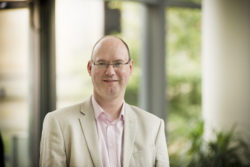Jason Lowe
 Name:
Name:
Jason A. Lowe OBE
Job title:
Priestley Chair, Interdisciplinary Climate Research
Area of work, and why it’s important:
Understanding how much the climate might change in the future on global to local scales and then trying to make sure that information is available to and usable by as many people as possible so they can make the best informed decisions. My interests focus on both understanding the global climate response to different emissions pathways and the role of mitigation, and the local climate variability and change that we need to understand and characterise in order to plan the optimum ways to adapt.
What will you be doing at COP26?
At COP26 I’ll be representing both the University of Leeds and the Met Office (where I work when not at Leeds). I’ve been involved in planning events ahead of COP26, such as our week of climate events in Leeds back in April, plus the planning of a number of events to be held in the science pavilion in Glasgow during COP. During the conference I will likely be involved in events on financial stress testing, mitigation science and provision of geo-spatial information. I say “likely” because plans are still being finalised – this is usual for COP events.
What are your hopes for the COP26 negotiations?
As a scientist I see my role as making sure the scientific evidence is available widely so that people can make their own informed decisions that are right for them. As a citizen I’ll be hoping for a future where we avoid dangerous climate outcomes in a just way. This will need more ambitious global reductions in emissions and more rapid implementation of suitable adaptations as some further climate change is now unavoidable. We also need to see more recognition of the co-benefits of well-planned climate action which I think has not been visible enough in many previous climate negotiations.
Any tips for readers about climate action?
Climate sciences have helped to understand the changes that have already occurred and the human fingerprint within the climate change observations. Consider how the science can be better used to address the challenges of mitigation and adaptation. But remember, climate change is driven by people and affects people. The challenges of climate change need to be solved by people too.
Anything else you want us to know?
If you’re going to COP26, wear comfortable shoes - there is a lot of walking involved!
